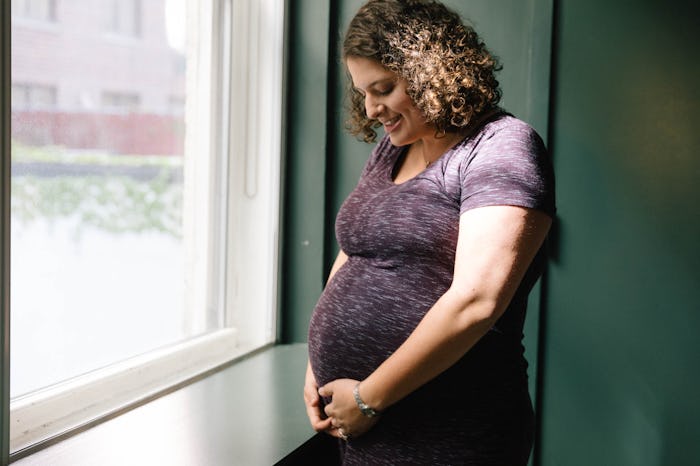Life
Don't Panic Yet — Here's Why Your Baby's Movements May Slow Down
Feeling your baby move inside you is one of the most magical things you can experience as a pregnant mother. It's so surreal to know that you're growing an entirely new person while you go about your life. However, it can also be a cause for anxiety and worry. Counting kicks and fetal movement tracking can put you on edge. What does it mean if the movement changes? You may think to yourself, "Why isn't my baby kicking as much?" I know I have had similar worries.
With my first child, I was in a constant state of low-level panic. I had many health problems, and the big one — anemia — could affect my son. The type of severe anemia I had put my son at risk for pre-term birth and a low-birth weight. I was pretty terrified. I dutifully counted his kicks and I monitored his movements. One night in my third trimester, it was as if he stopped moving entirely. My low-level panic went into a full-on attack. I called my OB-GYN and she suggested drinking some juice and taking a walk. It worked. My son perked right up and was very pissed off that the juice made me wretch so hard. (I still can't drink apple juice to this day. Or tequila since undergrad.) But that's not the case for everyone. If you're asking, "Why isn't my baby kicking as much?" I can assure you, it's normal to worry.
I asked midwife Chavah Meira BenZion and she tells Romper that there are a number of reasons. "First, the normal and healthy reasons. The baby is running out of space as she grows and the movements feel less strong simply because there isn't as much room to move." She notes that a baby may be quiet in the hours leading up to birth, resting for the big show. Sometimes, she says, it's an anatomical issue. "The increased uterine tone of late pregnancy has the effect of tightly swaddling baby so it's not as easy to move freely." It's like you start hugging your baby before they're even born — I like that thought. BenZion tells Romper that once the head is locked and loaded, your baby just physically can't move as much, and sometimes, women with an abundance of amniotic fluid can't detect movements as well.
Then, there are the more worrisome reasons. Things like placental insufficiency, which she says is when "the placenta isn't doing a very good job supplying oxygen and nutrients to, or removing waste products from the baby." BenZion goes on to add, "If the mother's blood pressure is elevated or her health is compromised for a number of reasons, then the placental flow may not be adequate," which can also lead to decreased fetal movements.
Scary as those sound, they're not the norm. "Generally, a mother should feel what I call two or more 'playtimes' per day, which are (usually felt at similar times per day) intense periods of activity for at least 20+ minutes. In addition, she'll feel numerous other random movements as baby readjusts her position slightly." Benzion notes that your baby might rest for a bit after a period of high activity, too. Similar to how I get one room of my home clean and then lay on the sofa reading for an hour before I decide that I may need to clean the rest of it — or not.
It's easy to get really worried and wrapped up in the movements — I know I did. If you feel like something is off or wrong, or you've noticed a marked dip in movements, call your provider. Not only is it the best thing to do, it can also really ease the burden of worry.
Check out Romper's new video series, Romper's Doula Diaries:
Check out the entire Romper's Doula Diaries series and other videos on Facebook and the Bustle app across Apple TV, Roku, and Amazon Fire TV.
This article was originally published on
